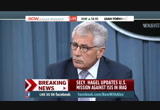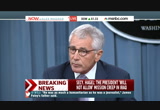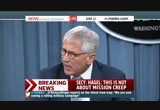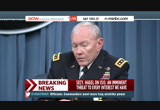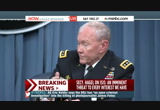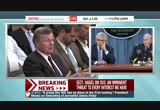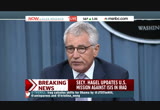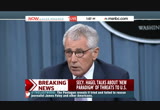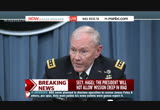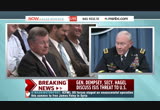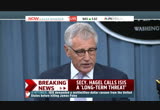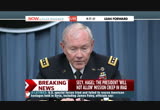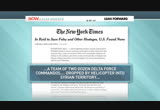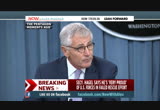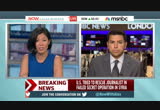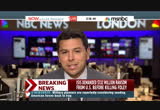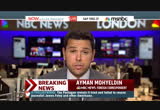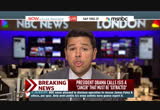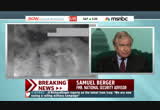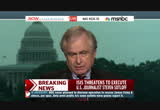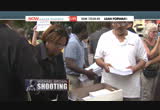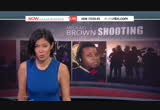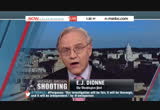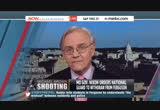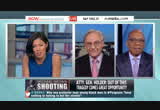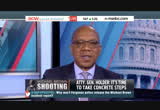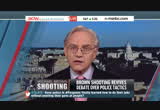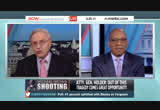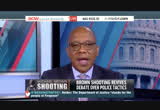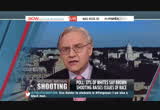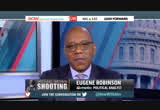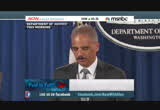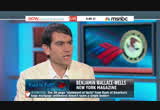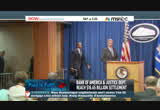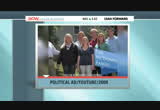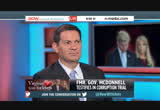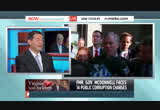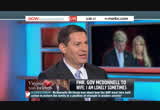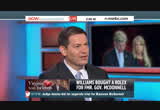tv NOW With Alex Wagner MSNBC August 21, 2014 1:00pm-2:01pm PDT
1:00 pm
>> he is absolutely part of the problem. >> kevin? >> secretary, the charters of iraq, going beyond helping humanitarian and beyond protecting americans and directly going after isil through the iraqis or not, does the pentagon believe it has the authority and have you talked to the general counsel or do you need additional or different type of authority going forward? >> to start with, the president's been very clear on the mission, and he's made it very clear that he will not allow that and this is why he's been very clear on what our mission is. we comply with the war powers act and in foreign congress on how many people we have. of course, we consult with our
1:01 pm
counsel all of the time. do we have the domestic authority and do we have the international authority on all actions and as we do on everything we do. again, i'll bring you back to the president's comments on mission creep. this is not about mission creep. >> we want you to talk directly to the american public. should the american public be steeled for another long, hard slog against isis? mr. secretary in july you painted them as an imminent threat and not even george bush called saddam hussein an imminent threat. he called him grave and gathering. you talked about defeating isil over time. should the public start getting prepared for another long, hard slog like secretary rumsfeld talked about fighting al qaeda in the fight to eliminate isil? >> well, as to the comment about an imminent threat i think the
1:02 pm
evidence is pretty clear. when we look at what they did to mr. foley, what they threatened to do to all americans and europeans. what they are doing now, and i don't know any other way to describe it other than barbaric. they have no standard of decency, of responsible human behavior, and i think the records are pretty clear on that. so, yes, they are an imminent threat to every interest we have whether it's in iraq or anywhere else. you've heard me speak about the fact that we've gone from a narrow focus on al qaeda to the recognition that in the aftermath of the arab spring and the disenfranchised populations that i've described a lack of governance and sanctuary, failed
1:03 pm
states and declining nationalism. you've heard me talk about all of that and we've had groups that now kind of are loosely connected in some cases affiliated that run from afghanistan and the peninsula that run into the heart of africa and north and west africa. so in general, the conflict against those groupses, most of which are local, some of which are regional and some of which are global in nature, that will be a very long contest. it's ideological, it's not political. it's rell edgeous, in many cases and yes, it will be a long contest, but when you ask me if the american people should steel themselves for this long conflict, there will be required participation of the united states of america and in particular a leadership role to build coalitions to provide the unique capabilities that we
1:04 pm
provide, but not necessarily all of the capabilities to work through this thing using three different military tools and one is direct action. there will be cases when we are personally threatened and u.s. persons and facilities are threatened that we will use direct action. if told to use direct action for other purposes we'll be prepared to do so. i haven't been asked. the second one is building partner capacity and that's real willy where this has to reside. we've got to have them take ownership of this because, frankly, if we own it, they're not going to be that interested in it and then the last one, of course, is enabling which is to say enabling our partners which is what you see us doing somewhat now in iraq with both the iraqi security forces and the peshmerga and i think you will see that enabling function used as well. >> you were talking about this threat and a war-weary america
1:05 pm
and i think most americans are asking, well, what is the isil threat to us here at home? could either of you describe the terrorist threat that isil represents to americans and should americans begin to follow -- this they be prepared for a perpetual war on terror? >> well, i'll take the first run on it and marty can crespond, a well. jim, what happened in this country on 9/11, 2001, when you asked the question about should americans see this as any kind of a threat, as an imminent threat and what's the issue and this is in iraq, i doubt if there were many people that would have thought there was much of a threat the day before 9/11. that happened a few years ago. this country is far better
1:06 pm
prepared today in every way for th this, but terrorism is not new to the world. the sophistication of terrorism and an ideology that the general was talking about, married now with resources now presents a whole new dynamic and a new paradigm of threats to this country. the sophistication, technology, money, resources and all of that is different and we can't ask the question of ourselves as leaders who have responsibility to the security of this country to say it wasn't that big a deal. they're far away. every day the intelligence community of this country, no matter what the administration is or the secretary is that we don't want to face that again ever. 9/11 or any part of it so we have to look at this, jim, from
1:07 pm
the reality of what's out there, but also what could be out there and what could be coming and is this a long term? sure, it's a long-term threat. >> is it the calculation that isil presents a 9/11-level threat to the united states? >> jim, isil is a sophisticated and well-funded as any group upon that we have seen. they're beyond a terrorist group. they marry ideology, a sophistication of strategic and tactical military prowess. they are tremendously well funded. this is beyond anything that we've seen so we must prepare for everything, and the only way you do that is you take a cold, steely, hard look at it and get ready. >> the immediacy is in the number of europeans and other
1:08 pm
nationalities who have come to the region to become part of that ideology and those folks will go home at some point. it's why i have conversations with my european colleagues about their southern part of nato which is more threatened in the near-term than we are. nevertheless, because of open borders and immigration issues and it was an immediate threat and the fighters who may lead the current fight in my great home. longer term, it's about isil's vision which includes -- i actually call isil isis, because it's easier for me to remember that it is the islamic state of al sham and it's jordan, iraq, syria and kuwait. if they were to achieve that vision it would fundamentally alter the face of the middle east and create a security environment that would certainly threaten us in many ways.
1:09 pm
>> i know the president and you all talk about right now it's iraq's responsibility to take control of their own country, but isn't the u.s. already at war with isis? >> are you looking at me? >> you're the general? >> do i look like a guy that would answer that question in front of the -- the declaration of war is a policy decision, not a military decision. >> is there any estimate of how much these operations in iraq have cost so far and you're organizing a long-term strategy, might you need to reshape your friend 15 budget to accommodate for that? >> maybe. >> well, depending, first of l all, i'll go back to the reference that i
1:10 pm
we've asked the congress for half a billion for the moderate syrian opposition. yes. you are constantly shaping a budget and it showed that resources matched the mission and the resources and the mission matched the threat and it isn't a process that is void of the dynamics of a changing, shifting world and requiring resources as you plug those resources in to your strategy to assure that you can carry out that strategy so, yes, you're shifting all of the time to what will be required. we've had to move assets over the last couple of months, obviously, to accomplish what we've accomplished in iraq. that costs money. that takes certain monies out of certain funds. >> it's a constant, fluid
1:11 pm
process as you plan for these. general, do you want to say anything? >> yeah. i mean, the adaptations we've made to our global posture and in particular to our regional posture in response to the tasks that we've been given has been really remarkable. it reminds me never to forget to thank those that serve in uniform for incredible agility to confront whatever issues confront them and there are a let of issues confronting us globally right now and we're answering the call and we'll continue to do so, but there may be a point where i think we're fine for fiscal year '14 and we'll have to continue to gather the data and see what it does to us in '15. >> thank you. >> thank you very much. >> thanks very much. >> that was secretary of state of defense chuck hagel and chairman of the joint chief of staff martin dempsey at a live
1:12 pm
briefing of the pentagon. in the 48 hours since jim foley's brutal execution video was released, the length to which the white house went to save his life and others kidnapped in syria has become increasingly clear. earlier this summer president obama authorized the nighttime mission to rescue foalet and other americans being held captive. a team of two dozen delta force commandos were deployed and dropped by helicopter into syria. the operation failed because there were no hostages to be found. a defense department official told the the new york times the hostages were moved, quote, a matter of hours, perhaps a day or two earlier. this is the first time the administration has acknowledged that american forces have operated inside syria. moments ago defense secretary hagel made his first comments on foley and the defense operations in syria. >> let me offer my deepest condolences and sympathy to the family of jim foley, the american journalist who as you
1:13 pm
all know was savagely murdered by the isil. earlier this summer the united states attempted a rescue of a number of american hostages held in syria including jim foley. we all regret that the mission did not succeed, but i'm very proud, very proud of the u.s. torses that participated in it. >> there is one thing the united states did not do to free jim foley and will not do as a matter of policy and that is to pay a ransom. isis wanted the u.s. to pay $132 million for foley's life, but because -- but because it is american policy, no ransom was paid to isis and foley became the second western reporter to be killed and beheaded by extremists since daniel pearl was beheaded by al qaeda in 2002. at that time al qaeda militants asked for a ransom of $2 million for pearl which is $130 million less than what they demanded for
1:14 pm
jim foley, but it is not really about the dollar amount. it is about the policy and the death of jim foley has revived that debate, on large part because the western counterparts do pay ransom and europeans held captives often return home. al qaeda and its affiliates have taken some $125 million in revenue from kidnappings since 2008. 66 million dollars from last year alone. it is a policy that the times says has turned kidnapping europeans into a global business for al qaeda, bankrolling operations across the globe. while that has led to europe becoming something of an inadvertent underwriter of al qaeda, these ransom payments have led to the release of journalists. 20 are believed to be in syria right now. many of them with isis. one of them is american journalist steven sotloff whose life is threatened by isis if the u.s. continues air strikes
1:15 pm
in iraq. the u.s. launched six air strikes against isis targets. joining me now is nbc news correspondent eamon mohyeldin. martin dempsey and defense secretary chuck hagel, there were u.s. operatives inside syria. how much of that is a surprise to those in the region? well, it's certainly a tremendous surprise. no doubt the u.s. has watched what has happened very closely in syria. they are very engaged in supporting the syrian opposition and syrian opposition factions and for the first time to have troops and boots on the ground inside syria publicly acknowledged by the united states is certainly a significant point because it shows that there say willingness on the obama administration's part to go and get involved in this conflict if it means saving american lives.
1:16 pm
the question and certainly the argument you're going to hear in the coming days is if you're doing it for the safety of american lives and you feel that the situation is so dire that you have to take this action then certainly you can also do it to save the lives of other people and certainly that is going to be a question that is going to be a concern for the u.s. to make sure it doesn't drag the united states into the syrian conflict. what you are seeing here is that the dam has been broken and the argument that the u.s. would not get involved in the syrian conflict now to some measure has broken, if you will and the argument that the u.s. can get involved now appears to be a possibility. >> let's talk a little bit more about jim foley. eamon, you have reported from war zones and you have seen danger. in terms of journalist awareness of what potentially lies away from them and how confident are they and what alarm bells have been ringing in greater furor in
1:17 pm
recent months and years than previously. >> well, i think that the syrian conflict has posed a set of new challenges for foreign journalists inside for syria and iraq. i think what we've seen in the past, certainly there are always challenges for foreign journalists reporting on the ground. this has become as you mentioned in the introduction a bit of a global business. the kidnapping of foreigners from the european perspective that can then be used to fund these organizations and that can make the kidnapping of foreigners lucrative. there is, unfortunately, the shift in ideology where the journalists are not seen as neutral or objective observers of a country, but rather representatives of their country and representatives of their organizations. therefore, for many of these isis fighters, these are groups that no longer see nationality or see nationalities as important indicators. what they are seeing is simply
1:18 pm
an american or european and for them that is valuable. they're not making the sit difrngz between american citizen or american foreign policy or european and that is extremely troubling and compounds the dangers that foreign journalists have to deal with on a regular basis in addition to the fact that many of these groups are not necessarily the ones kidnapping the journalists or foreigners. sometimes what we've seen in the pack is the a local group, tribe or family trying to kidnap this individual for money and sold and traded upward to a more politically driven organization like isis. >> nbc's eamon mohyeldin, thank you as always for your time. joining me time is former national security adviser under president clinton, sandy berger. thanks for joining me on a very busy day as it comes to the issue of national security. let me ask you first that martin hagel and the efficacy of u.s.
1:19 pm
airstrikes how much do you think we can do, given the limited nature of this engagement? >> isis military air strikes can be a part of the answer, but they cannot, by themselves, be the the answer. there needs to be forces on the ground that ultimately push isis out whether those are iraqi security forces or as in the case of kurdistan, they were kurdish forces and ultimately sunnis will push isis back and not americans. so we have to have a political and a military strategy. we have to have a political strategy to help build up an iraqi government that has some legitimacy with the sunnis which the maliki government didn't have and a military strategy which uses our air power as an adjunct to that political
1:20 pm
strategy. >> the crisis in syria has been ongoing as you know. 180,215 people have perished in what folks are calling a civil war. the president, of course, drew a red line around it, but the killing of jim foley, i think marks an inflexion point for the american public in term of raising awareness and i think a lot of americans are feeling deeply wronged by what happened on that video. let me ask you a little bit about our u.s. policy in terms of not paying a ransom. to what degree do you think we need to to have broader negotiations or agreements with the europeans about what western nations are doing in the face of terrorism and hostage taking? >> i think that video obviously was very powerful. the video was intended to send us a message which was leave us alone, and i think, in fact, the video sent a message which says we can't leave them alone.
1:21 pm
i think it is unthinkable or negotiate and pay ransom to a group like the islamic state. the united states is not belgium. we cannot be ginn the process of financing and the kind of groups that these people represent. al qaeda is basically bankrolling itself with ransom ones that it gains from kidnapping people around the region and it's not something that we i think can engage with without encouraging really more -- more of this activity. it's painful to see the consequences of that kind of decision, but i think it's really unavoidable. >> let me ask you this, sandy. we have new today, that in 2002, george w. bush changed our policy and i'm not sure where it went and that we would change
1:22 pm
the policy across the board that we would not pay ransom because of an interview done during the clinton administration. i wonder as a former national security adviser, that sounds dramatically different than our approximately see today? >> we certainly never paid ransom to any -- in any situation during the clinton administration. so i'm not sure what that refers to. i think it's not a policy that's appropriate. it's counter productive morally and practically. i think it seized the kind of conduct we're trying to stop and, you know, we simply have to have a bright line. >> given the fact that france and belgium are paying ransoms, how effective can our policy be unless there is an across the board agreement and do you think this moves the needle at all. >> the united states is not
1:23 pm
france. >> i guess, what do you mean by that? >> we're a much larger target. we are, in fact, the principal target of groups like this. if they believe that they can now engage us in a financial enterprise of kidnapping for money and that becomes a growth industry for us and we're simply feeding the fire if we engage in a much bigger prize for isil and engage the united states in a self-financing scheme than to engage france or spain. >> former national security adviser sandy berger. thank you. >> good to see you. >> there say measure of peace in ferguson, but is there any justice. i'll talk to "the washington
1:24 pm
post's" e.j. dion next on "now." [ female announcer ] it's simple physics... a body at rest tends to stay at rest... while a body in motion tends to stay in motion. staying active can actually ease arthritis symptoms. but if you have arthritis, staying active can be difficult. prescription celebrex can help relieve arthritis pain so your body can stay in motion. because just one 200mg celebrex a day can provide 24 hour relief for many with arthritis pain and inflammation. plus, in clinical studies, celebrex is proven to improve daily physical function so moving is easier. celebrex can be taken with or without food. and it's not a narcotic. you and your doctor should balance the benefits with the risks. all prescription nsaids, like celebrex, ibuprofen, naproxen and meloxicam have the same cardiovascular warning.
1:25 pm
they all may increase the chance of heart attack or stroke, which can lead to death. this chance increases if you have heart disease or risk factors such as high blood pressure or when nsaids are taken for long periods. nsaids, like celebrex, increase the chance of serious skin or allergic reactions, or stomach and intestine problems, such as bleeding and ulcers, which can occur without warning and may cause death. patients also taking aspirin and the elderly are at increased risk for stomach bleeding and ulcers. don't take celebrex if you have bleeding in the stomach or intestine, or had an asthma attack, hives, other allergies to aspirin, nsaids or sulfonamides. get help right away if you have swelling of the face or throat, or trouble breathing. tell your doctor your medical history. and find an arthritis treatment for you. visit celebrex.com and ask your doctor about celebrex. for a body in motion.
1:26 pm
1:27 pm
after nearly two weeks of unrest there is an uneasy calm in ferguson today, but there seem to be no end to the protests of the police shooting of unarmed teenager michael brown. a peaceful rally outside the county courthouse delivered a petition of 70,000 signatures calling for the removal of st. louis county prosecutor bob mcculloch from his deep ties to the department. >> the people, they don't believe he would do the right thing. they don't have the confidence that's needed and that's why we have 70,000 signatures that we will be delivering to him today. >> there was a moment of tension when state senator jamila nasheed was blocked from trying to enter the courthouse with the signatures. >> as for the prosecutor, bob mccan culloch remains firm that
1:28 pm
he will remain on the case. >> although i strongly believe that such action would be a mistake on the part of the governor, i do urge all seeking my removal to express those demands to the governor. only the governor can answer this question. >> despite ongoing tensions, the mood in ferguson has been less volatile in the past 24 hours. this afternoon governor thingson ordered the national guard to begin withdrawing ending the role in the growing protests. last night marked the quietest night since brown's shooting. the calm came after eric holder vowed a thorough investigation. holder seemed optimistic that something positive would come out of all of this pain. >> out of this tragedy comes a great opportunity for reforming that community, but i think that's something that we can donation wide. this has engendered a conversation that we ought to
1:29 pm
have, but we can't stop at that conversation. it's time to take concrete steps. >> joining me now from washington, "washington post" columnist and contributors, e.j. dion and eugene robinson. you have a column today that takes an optimistic vow that all of us have had a pessimistic understanding of which is interpretations of what happened in ferguson by race and you point out these two statistics from a pugh poll comparing white and plaque attitudes in the wake of trayvon martin when 78% of black respondents that the case raised important issues about race and 28% of white respondents agreed. when 80% of plaque respondents thought it raised important issues about race and 37% of white respondents thought it did. i look at those, and i thought it seems pretty large, but the difference between 28 and 37 is measurable. tell us a little bit more about
1:30 pm
why. >> right. the reason i wrote that column is because people have taken that poll and other polls and really emphasized the divisions between white americans and african-americans and there is no doubt that we do look at this differently. the history of racism in our country is there and it affects the way whites and blacks view this, but what struck me that's important to note is that there was clearly a great deal of empathy across racial lines for michael brown. it wasn't 80% one way or 80% on the other side. whites were split. there were other questions in the poll where there was a large number of undecided white people which suggested people are absorbing this and trying to figure it out, and i guess my own concern is countries tell themselves stories and if we keep telling ourselves a story that there can be no
1:31 pm
understanding about racial lines on a matter like this, we take away a chance for dialogue when there were clearly a lot of people in the country including a lot of white americans that say yeah, i get why african-americans are upset. there is something disturbing about this young man being shot. >> eugene, to e.j.'s point, what has been impactful is not, of course, just the horrific death of -- we're talking about trayvon martin and michael brown, two young black men and also the response of the country's top black officials and i mean by that, specifically president obama and eric holder who today or yesterday, i believe, said something that was as staggering as what the president said when women clutching his purses closer. >> i think about my time in georgetown, a nice neighborhood in washington, and i'm running to a movie about 8:00 at night and running with my cousin and a police car comes driving up and
1:32 pm
flashes his lights yells where are you going? hold it. at the time he stopped me i was a federal prosecutor. eric holder has confronted this kind of racism himself and it is, when you hear these stories i think it is a wake-up call for every person in america, white, black, asian, hispanic, green, blue, whatever that this is a real racism, it is a real thing in contemporary society. >> this is a thing that many black men in the country have had of being stopped on the street or in the car for no reason other than walking while black or driving while plaquebl neighborhoods where they didn't think you should be. it is an experience that many of us have had, but the point that e.j. makes is absolutely right, and i said before that this is the way we have our national conversation about race and we
1:33 pm
don't sit around in a circle and in an agenda and something happens and we argue about it and it gets scratchy and uncomfortable and we get tired of talking about it and it doesn't seem like we've made any progress, but eventually we do. often we do make progress and it may be reflected in that difference between 28% versus 27% so maybe consciousness gets raised like this in ratchets rather than continuously. >> maybe some of the progress we see is incremental shift in policy around something like policing. we know, e.j., that in cincinnati, for example, they have undergone what seems to be a fairly successful overhaul of the way police are trained and they're trained in low-light situations and they're trained in how to recognize potential mental health issues and they've changed their foot pursuit policy. a variety of things that have really changed and in some ways turned around the racial bias
1:34 pm
that was a hallmark of the cincinnati police department and now with technology like gopros and cameras that can be outfitted on police gear, there is a whole new level of accountability. i wonder if you think, are you optimistic that we'll see some of this enacted in ferguson and elsewhere in the country? >> i sure would be disappointed if the officials in ferguson don't try to learn lessons of this. as you suggest, we are capable of social learning and that you've seen it happen elsewhere, and i think one of the striking things about ferguson and why it's been such a big news story is that they seem like so much of a throwback and again, they talk about that we don't necessarily understand in the same way across racial lineses. i obviously have not been stopped on the street because i'm black. i thought that you had fewer police departments like the one there that are so far out of line in terms of its racial composition with the composition
1:35 pm
of the community. so, yes, i think the short answer is, we surely have made progress from where we were 40 years ago, and i suspect we've made some progress and not good enough progress and progress from where we were 20 years ago and there is humanity across racial lines. people, i think, instinctively of course of their own kids when they see a young kid shot like this. >> unieen, i think the other part of this is we know we've made progress when the changes are enacted not because a young man has died, but because it's the right thing to do. >> you shouldn't have to have the death of an unarmed plaque man be the catalyst for a police department that is more engaged in the community that it polices. >> this is the optimistic segment about ferguson. >> that's what we're trying to do, ueugene. >> let's look at the fact that rand paul since we're talking
1:36 pm
about disparities in law enforcement and justice in this country. the fact that young, black men are four or five times more likely, for example, to be arrested and imprisoned for minor drug offenses than white men who commit the same offenses. that sort of systematic and pervasive discrimination is what we need to look at and what we need to eliminate. so this shines a light on that and makes people pay attention then it's a good thing. >> to that end, e.j., when there is bipartisan support for criminal sentencing reform, i wonder what you think the outcome will be on the pentagon's 1033, and the militarizing of local and state police forces. emmanuel cleaver is calling on congress to revisit it it. do you think that will carry forward until congress is back in session? >> i have a feeling it does. the criminal sentencing or
1:37 pm
forward movement really is a hopeful movement because it does cross political lines. there is a very conservative group called white on crime that's been involved in criminal justice and the militarization of these forces was partly an accident. if we had some legitimate thingses we tried to do after 9/11, but now, i think a lot of people on both sides of politics say this has gone way too far. we don't need to militarize our forces to this degree, and i think that will one will stay around as an issue, and i hope it it does. >> eugene, not to be pollyannaish about this, but do you think we are getting and it's been such a difficult, traumatic week for this country, and i just wonder as we come out of this, and by no means is it over, michael brown has not been laid to rest, but when you look at where we are, do you feel
1:38 pm
like we're edging toward a more perfect union? >> i certainly hope so. i don't think it will necessarily feel like we are when this dies down and when the cameras leave ferguson and i don't think we will feel right then that we've made any great progress, but i think when we look back two years, three years from now we'll say, gee, that had an impact and it wasn't -- it was a tragedy, but we made some good and some progress come out of it and that's the hopeful view. >> e.j. deion and eugene robinson from the washington post, thank you both. >> thank you. >> thank you. just ahead, bank of america and the justice department finally reach a deal on the biggest mea culpa in u.s. history. new york magazine benjamin wallace wells joins me coming up next.
1:42 pm
the department of justice has reached an agreement with bank of america totalling over $16.6 billion in penalties and consumer relief. >> and so it is official, bank of america and the department of justice have agreed on $16.65 billion as the a prep atpunishment for faulty mortgage securities sold in the run up to the financial crisis. the deal, the largest settlement ever between the government and a single company eclipses the $7 billion settlement of citigroup and the $13 billion settlement with j.p. morgan chase, still, the monster settlement has plenty of critics who say the amount is too little and it is too late, but while 16.65 billion is approximately equal to the bank of america's total profit of the past three years, this is a bank that has already spent close to $80 billion on legal costs related to the financial crisis and "the new york times" reports that more
1:43 pm
than any other wall street giant, bank of america helped ignite the crisis. the u.s. government's decision to settle whether than to late gait t litigate the deal in court. then there is the issue of criminal responsibility. >> this outcome does not preclude any criminal charges against the bank or the employees. >> today's deal didn't preclude them, and it it doesn't include them either. perhaps with that in mind, federal prosecutors announced they're preparing a lawsuit against former countrywide angelo mozilo, the man associated with selling subprime mortgagees. benjamin wallace wells. >> good to be here. >> it is a big day. this is in some ways which the u.s. government believes is the closing chapter of the subprime mortgage crisis, the financial crisis and yet, a feeling of
1:44 pm
sort of vindication and satisfaction is, i think, fleeting on some level. what do you see as the pros and cons -- how do you weigh this decision, when you think about it? >> for me it feels like it's not quite enough. it doesn't feel like a firm shutting of this chapter. what would have been really helpful, what would have been nice about a trial is to have real transparency, you know? to be able to look back at this crisis and look at what happened with banks and see where banks went wrong and were more regulations needed and to get a full anthrop algology of accoun and it we're talking about ferguson all of the time because there is a similar process there is a sub culture that seems to have gone screwy, you know? in the mortgage case it was
1:45 pm
mortgage bankers that were not thinking about consequences and in ferguson, we see a police department that was a sub cultural detachment and one of the things you want to know when you're trying to regulate agencies like this generally to figure out how companies work is how exactly did that go wrong? there's a -- there would have been a social benefit to understanding exactly what happened here that i don't think we quite get from the settlement. >> and to go further with that metaphor, there is, in both ferguson and the case of financial crisis, a tacit sort of agreement that some session ams ofs issity are just going to get the short end of the stick. >> they're going to be targeted by some parts of the institutions designed to protect them or they'll invest their money or enter into mortgages or they may lose their entire house. the cost of the crisis, $16 trillion in two years from 2007
1:46 pm
to 2009. to that point, a lot has been made about where it is this money goes. in the bank of america settlement, $9.65 billion is the cash penalty and $ 7 billion goes to consumer release and without getting too deeply in the leaves here, the consumer relief piece is fungible. it's a gray area and in some cases according to an a.p. analysis some relief comes from actions that doesn't cost anything including making loan in depressed areas and in the case, they were doing some of this stuff before the doj brokered the deal with them. >> sure, everybody on cnbc was touting bank of america and it's a great bet going forward. >> and their stock has gone up and the people who know the most think it will go up more. so you can sort of -- you can clearly see that reaction. >> let me ask about the criminal
1:47 pm
proceeding. >> sure. >> there is what is called the holder doctrine in certain circles which is a 1999 memorandum that he wrote as deputy attorney general outlining his preference for financial settlements believing that prosecutions can cause economic of the american financial system. i also think that this administration has made it better to settle for the big wad of cash and be able to go out and say as eric holder did today, we got this from them rather than go through the protracted legal proceeding. i wonder if you think some criminal charges would temper the american sense of frustration and anger that is reserved for the financial sector at this particular moment. >> i wish i could say yes because i think a lot of this is sort of reasonable here, but what we know from every other kind of crime is that the punishment doesn't deter future
1:48 pm
behavior. the deathreat of a death penalt doesn't deter people from killing other people. the ethical and moral lines are murkier and harder to excuse yourself from and you have a culture that is, you know, pushing you to push them. i don't know that criminal charges in the case like this would do a ton to restrict future behavior. >> you agree with bill clinton who said you can take lloyd blankfein into a dark alley and slit his throat and it would satisfy them for about two days and then the bloodlust would rise again. >> he says bloodlust like it's a bad thing. >> ben wallace wells. good to see you, buddy. >> they say love is blind, but for virginia's former governor and his first lady, it is apparently eyes wide open. the latest in the mcdonnell
1:49 pm
1:50 pm
we are the solis family. and this is our chex commercial. there's lots of choices and each of us has a favorite. like chocolate, honey nut and cinnamon. there's no artificial colors or flavors. that's good. and it's gluten free. so we're jumping for joy cause it's full of what we love, free of what we don't. and that makes for one very happy family. chex. full of what you love. free of what you don't.
1:51 pm
wouldn't it be great if hiring plumbers, carpenters shopping online is as easy as it gets. and even piano tuners were just as simple? thanks to angie's list, now it is. we've made hiring anyone from a handyman to a dog walker as simple as a few clicks. buy their services directly at angieslist.com no more calling around. no more hassles. start shopping from a list of top-rated providers today. angie's list is revolutionizing local service again. visit angieslist.com today. nobody ever stomped their foot and asked for less. there's a reason it's called an "all you can eat" buffet... and not a "have just a little" buffet. because what we all really want is more. that's why verizon is giving you even more. now, for a limited time, get more data! 1 gb of bonus data every month with every new smartphone or upgrade. our best ever pricing with the more everything plan and 50% off all new smartphones. like the htc one m8 for windows or android. built to inspire envy. come get your more with verizon.
1:52 pm
the leadership, dad. >> sure did. >> leadership makes a difference. >> how about a game? >> you're on. i grow the economy and great jobs and the economy more accessible for virginia and enact bipartisan solutions for transportation. after all, we face the same challenges that you do. after all, we face the same challenges that you do. >> that was former virginia governor and family man bob mcdonnell during his first campaign in 2009. tonight a very different bob mcdonnell took the stand for the second day to fight federal corruption charges. he is fending off allegations that he and his wife accepted $177,000 in loans, wedding payments and rolexes from former cigarette manufacturer and dietary supplement guru johnie williams. >> this is really the campaign of your life, isn't it?
1:53 pm
>> i don't really look at it like that. i didn't ask for it, but my job -- >> mcdonnell's strategy here? lay there the tragic inner workings of his failed marriage and blame all of the questionable behavior on an angry, villainous with woman, his wife. today mcdonnell's defense introduced as evidence an almost -- letter from the governor to his wife. in it he wrote, quote, i am completely at a loss as to how to handle the fiery anger and hate from you that has become more and more frequent. i want to be in love not just watch movies about it. you tell me all of the time how bad your life has been with me and i will do anything possible to try to fix our marriage if you will work with me. in painting a very vivid picture of a marriage gone sour, mcdonnell is attempting to ensure the good reputation of a
1:54 pm
selfless, kind-hearted virtuous man, bob mcdonnell. to which a priest who knew mcdonnell in his college days the former governor embodies virtue and has never erred from the truth. joining me now is editor of bloomberg politics. i am going to say, i approach this with skepticism and yet i read the love letter from bob mcdonnell to his wife and it sounds like the marriage was pretty bad. we played the 2009 campaign ad, he has run as the family guy. how important is it to his long term career that he is potentially saying one thin and another thing was going on. >> i've covered politics for as long, and i've never seen anything like this in my life. it's incredible. i don't think he's got a political career left. >> do you really think that's true? >> yeah. >> mark sanford is back,
1:55 pm
serving. >> sure. the best case for him is he was extraordinarily sloppy in dividing his public life from his private life and in his trial he knew that this guy gave $15,000 to pay for his daughter's wedding. he's admitted to things that voters would find questionable. he's been in the private sector and that's probably where he'll go, maybe i'm wrong, but i'm skeptical. the goal here, though, in the short term is to avoid being convicted, and i think the case that they're making about the divisions in the marriage from the contemporaneous emails and the one you read and others make it pretty clear from the testimony of his wife's staffers makes it pretty clear that although in public this was about as well met as the person i covered and always seemed to be in a good mood and never seemed fazed by anything and obviously in private, things were not great for him and it's not the worst offense in the
1:56 pm
world. it seems pretty clear that at least part of the behavior that's linked up to the alleged illegal activity was that it was with the knowledge. >> and he was asked, i believe, during his testimony today, why not take up those issues with his wife. >> i had to choose my battles wisely that things were so fractured and tender in the raw sense and not in the loving sense that he couldn't say anything about the fact that she was taking extraordinarily large gifts from a diet pill guru, but does that stretch the believeability? >> to try to look inside their marriage further than he's already opened the window is difficult. it's pretty clear that he did not -- and this is not just from his testimony and the document, it's pretty clear that he didn't want to necessarily confront everything. >> yeah. in their life and that their lives were to some extent separate and the prosecution is not going to be able to show that he knew about a lot of the
1:57 pm
stuff she was doing in real time, some things he says he learned about after the fact and some of the money and some of the gifts he learned about only after the prosecution and the investigators started to look into this. i've never seen anything quite like this. i do believe it does bear ay resemblance, "l.a. law," season 4, episode justice served. not unlake the parallel. you have to find the truth in politics on tv. >> and a hollywood reference in everything. >> in that episode, the couple pretended to get marital discord and they made it clear there was no marital discord. in this case, there is marital discord and for the jurors, the question is was there so much that the bulk of this behavior without his permission. the other big thing is what he did for this guy. under virginia law, they could take these gifts unless he did a lot for him. >> mcdonnell said there is no
1:58 pm
evidence. >> what mcdonnell is arguing was the special treatment he got was the special treatment he'd give to anybody trying to create jobs in virginia and no doubt that williams, the man at the business end of this was trying to make money that would benefit virginia. as much as there's humor in the defense case, i don't think it was implausible on the face of it that mcdonnell doesn't think he did the guy favors and some of the questionable behavior he didn't know about. >> i'm not saying i would buy it? you're not saying they might exit the courthouse holding hands. >> i urge you to look at "lchl l.a. law" season 4, episode 14. >> rick perry now is being accused of criminal wrong, felonious behavior and chris christie has federal investigations and bob mcdonnell is testifying in his own
1:59 pm
behavior. how damaging is this for the republican brand? >> it's not right bucks it's the way it works. if you're a big fish politician and you get indicted and get acquitted and sometimes it helps you. >> a la rick perry. >> i don't see a political future in him, in part because i don't think he'll want to do it. those other guys, if they're acquitted, comeback city. >> just rocky style running up the stairses. >> down the steps of the courthouse, victory lap over at fox news. >> i'm probing. did you see what i just did? i worked in a hollywood reference. >> you did and i was humming under my breath, but i am so poorly miked, no offense, that you couldn't hear it it. >> mike halpern it is always good to see you. the american political journalism, hundreds of years old, apparently. >> and like leonard maltin. that is all for now today. i will see you tomorrow at 4:00
2:00 pm
p.m. eastern. "the ed show" is coming up next. good evening, americans. welcome to "the ed show" live from new york. let's get to work! ♪ ♪ >> also we hear today that officer wilson has an orbital blowout fracture of his eye socket and was he beaten severely by michael brown. >> the the orbital eye socket that was fractured and was nearly beaten unconscious. >> the source tells us pretty much crushed his eye socket. >> they've not been able to confirm that. >> the information coming from at gateway pundit. >> a well-placed source tells fobbing news.com. >> according to multiple reports. >> the source tells us. >> it has been reported -- >> we also hear a source telling fox news exclusively the only reporting the alleged injury to demonstrate that there will be much more to come in this case. >> does he not know
72 Views
IN COLLECTIONS
MSNBC West Television Archive
Television Archive  The Chin Grimes TV News Archive
The Chin Grimes TV News Archive  Television Archive News Search Service
Television Archive News Search Service 
Uploaded by TV Archive on

 Live Music Archive
Live Music Archive Librivox Free Audio
Librivox Free Audio Metropolitan Museum
Metropolitan Museum Cleveland Museum of Art
Cleveland Museum of Art Internet Arcade
Internet Arcade Console Living Room
Console Living Room Books to Borrow
Books to Borrow Open Library
Open Library TV News
TV News Understanding 9/11
Understanding 9/11